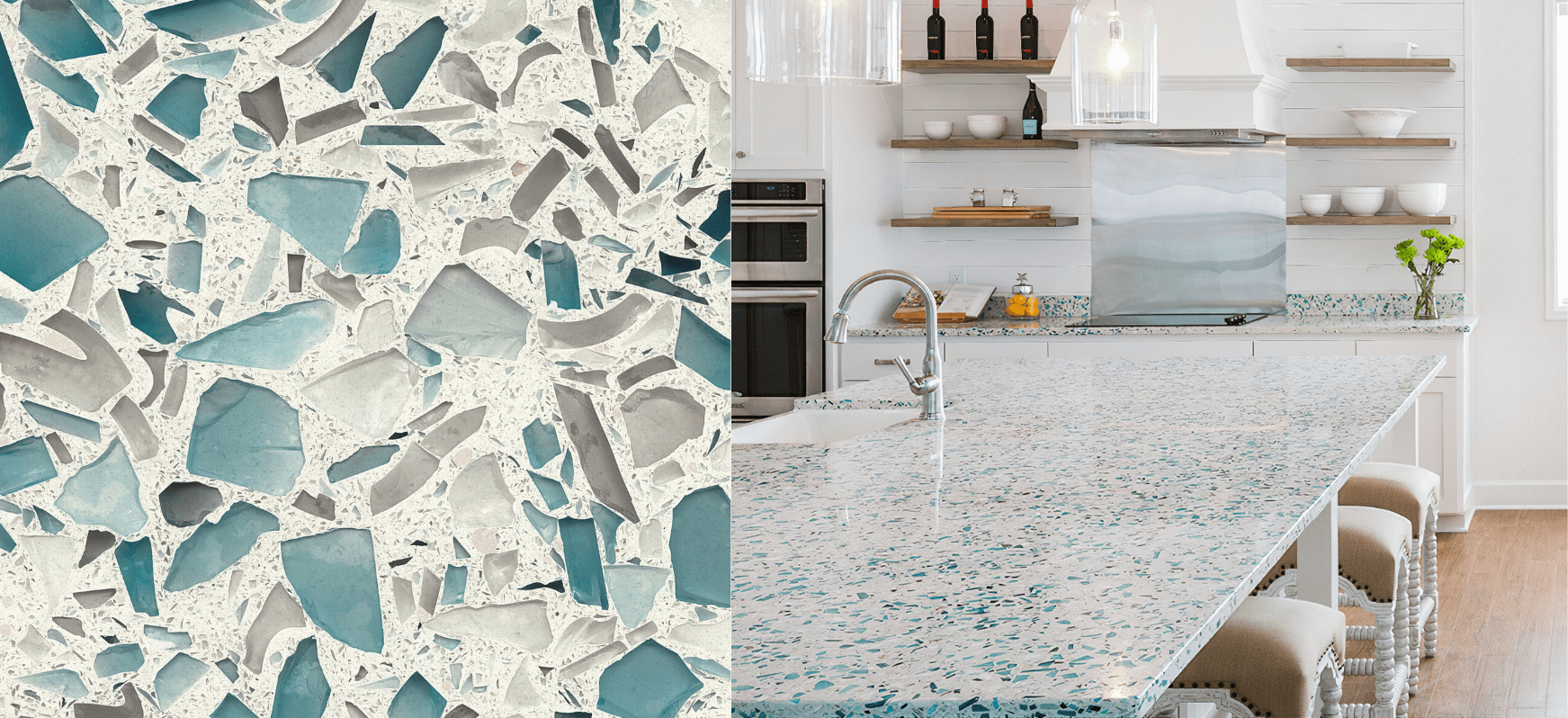Concrete and glass countertops, a harmonious fusion of raw elegance and modern sophistication, are transforming kitchens and bathrooms with their captivating allure. Their versatility extends across a spectrum of styles, from sleek and contemporary to rustic and traditional, offering boundless possibilities for personalized designs.
With their exceptional durability and ease of maintenance, these countertops stand the test of time, resisting scratches, heat, and stains effortlessly. Whether you seek a hygienic haven for your culinary adventures or a spa-like sanctuary in your bathroom, concrete and glass countertops promise both functionality and aesthetic bliss.
Design Options
Concrete and glass countertops offer an unparalleled range of design possibilities, making them suitable for various aesthetics. Their versatility allows for customization to suit any taste, from modern to traditional to industrial.
The color palette of concrete countertops extends from classic gray to vibrant hues like blue, green, and red. Pigments and stains can be added to create unique shades and patterns, while polished or honed finishes enhance the material’s natural texture.
Textures and Patterns
- Smooth and polished surfaces reflect light, creating a sleek and contemporary look.
- Honed finishes provide a matte texture, adding warmth and a more traditional feel.
- Exposed aggregate countertops showcase the natural beauty of the concrete’s components, such as pebbles or crushed glass.
- Stained and etched designs add intricate patterns and artwork to the countertop’s surface.
Modern Styles
- Clean lines and geometric shapes characterize modern concrete countertops.
- Neutral colors like gray and white create a minimalist aesthetic.
- Exposed aggregate or polished finishes add a touch of texture and interest.
Traditional Styles
- Ornate designs and warm colors evoke a classic feel.
- Honed or tumbled finishes create an aged appearance.
- Inlays of glass or metal add decorative elements.
Industrial Styles
- Raw and unfinished concrete surfaces create an industrial aesthetic.
- Exposed rebar or metal accents add an edgy touch.
- Dark colors like black or charcoal enhance the industrial look.
Practical Considerations

Concrete and glass countertops offer varying levels of durability and longevity. Let’s explore their resistance to scratches, heat, and stains.
Durability and Longevity
Concrete countertops are renowned for their exceptional durability. They are highly resistant to scratches and heat, making them suitable for busy kitchens. However, they can be prone to staining, requiring proper sealing and maintenance. Glass countertops, on the other hand, are scratch-resistant but less heat-resistant.
They can withstand accidental spills but may be susceptible to chipping or cracking if subjected to extreme heat.
Maintenance and Cleaning, Concrete and glass countertops
Concrete countertops require regular sealing to prevent staining. Mild detergents and water are sufficient for cleaning, but avoid abrasive cleaners or acidic substances. Glass countertops are relatively easy to clean with glass cleaners or a mixture of vinegar and water.
Regular wiping with a soft cloth helps maintain their pristine appearance.
Suitability for Kitchen and Bathroom Applications
Concrete countertops are suitable for kitchens due to their durability and heat resistance. They provide ample space for food preparation and can withstand the rigors of daily use. Glass countertops are ideal for bathrooms, where their non-porous surface prevents bacteria accumulation.
Their reflective nature enhances the sense of space and brightness.
3. Installation Techniques

Installing concrete and glass countertops can be a rewarding DIY project or a professional undertaking. Understanding the different installation methods and their respective steps will ensure a seamless and successful outcome.
Professional Installation
- Concrete Countertops:Professional concrete countertop installation involves creating a custom mold, pouring and curing the concrete mix, and then grinding and polishing the surface. This method requires specialized tools and expertise, ensuring precision and durability.
- Glass Countertops:Professional glass countertop installation typically involves measuring and cutting the glass to size, applying adhesive to the substrate, and securing the glass with clamps. This method requires precision and careful handling to prevent breakage or misalignment.
DIY Installation
- Concrete Countertops:DIY concrete countertop installation can be achieved using a pre-cast method. Pre-cast concrete countertops are manufactured off-site and delivered to the installation location, reducing the need for extensive on-site work. This method is suitable for those with basic DIY skills.
- Glass Countertops:DIY glass countertop installation is not recommended due to the inherent risks involved in handling and cutting glass. Attempting a DIY glass countertop installation without proper training and equipment can lead to breakage or injury.
Tips and Tricks
- Ensure the substrate is level and properly prepared before installing any countertop.
- Use a sealant to prevent moisture penetration and protect the countertop from staining.
- For concrete countertops, allow ample time for curing to ensure proper strength and durability.
- Handle glass countertops with care to avoid breakage or chipping.
4. Cost Analysis: Concrete And Glass Countertops

When choosing between concrete and glass countertops, it’s essential to consider the financial implications. Several factors influence the cost, including the material selection, fabrication process, and installation requirements. Understanding these factors can help homeowners make informed decisions and set realistic budgets.
Concrete countertops are generally more affordable than glass countertops, with material costs ranging from $50 to $150 per square foot. Glass countertops, on the other hand, can cost between $100 to $250 per square foot. The fabrication process also affects the price, as custom designs and intricate shapes require more labor and expertise.
Material Costs
- Concrete: $50-$150 per square foot
- Glass: $100-$250 per square foot
Fabrication Costs
- Concrete: $30-$70 per square foot
- Glass: $50-$120 per square foot
Installation Costs
- Concrete: $40-$80 per square foot
- Glass: $60-$100 per square foot
Final Summary

From the initial design inspiration to the final installation, concrete and glass countertops embark on a journey of transformation, culminating in a breathtaking symphony of style and durability. Their enduring appeal lies in their ability to seamlessly blend with any décor, creating a timeless masterpiece that elevates your living space.
